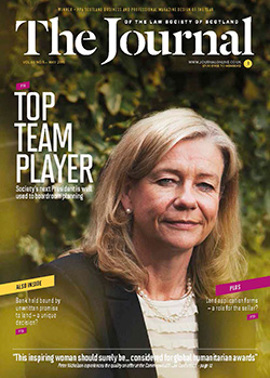For those of a certain age

Research on equality among Scottish solicitors has focused on vital issues – bullying and harassment, disability, the experiences of women and ethnic minorities in the profession – but the position of more experienced lawyers has been underexplored. The latest Society study provides an in-depth look at the challenges, and benefits, of working as an experienced solicitor in today’s legal profession.
Neil Stevenson, the Society’s Director of Representation and Professional Support, explains. “The Profile of the Profession survey we carried out in 2013 provided valuable insights into the legal profession and how it is working as a whole, but it was largely quantitative. Our latest, qualitative research builds on that by giving a much more detailed understanding of the issues facing older and more established Scottish solicitors, an area that had been underexplored until now.
“We were keen to follow up feedback that we might be better at supporting newer lawyers with careers advice and help, but not have the right services for those with more experience behind them. The report, Experiences of Established Legal Professionals within the Legal Profession in Scotland, makes a number of constructive and helpful recommendations. We will now look at those in detail.”
View from experience
As well as examining attitudes towards more established lawyers, the study looked at their motivations and aspirations, the consideration of other careers, succession and/or exit planning, and experiences of the Society and its services.
The research found that the motivations of more experienced solicitors evolved during their careers, shifting from issues around salary and promotion to focus more on the quality of their work and the team around them – including advising, training and mentoring more junior staff – as well as job satisfaction and helping clients. Achieving a suitable and acceptable work-life balance was thought to have become more important as respondents moved through their career, along with a desire for more personal time. For partners and those in management roles, recent motivations also centred heavily on business survival during the economic downturn. Some were concerned about their retirement and pension plans.
In terms of attitudes towards older professionals, the study considered whether the law was seen as a “young person’s game”. Some respondents agreed that certain relatively new areas of law – such as some corporate work, mergers and takeovers, technology law and the oil and gas sector – were geared more towards younger people. Others said there was a perception that that was the case when long hours were involved in legal work. An element of “burnout” in the profession was also identified due to the numbers of solicitors, particularly partners, who either retired early or took on less demanding and pressurised roles.
However, other respondents “felt that experience (far more so than simply age) still counted for a lot”, the study found. One respondent said that, while the younger generation of solicitors might be expected to work quicker and adapt better to new technology, they often lacked the knowledge and experience needed to find the best solutions, particularly in difficult or unusual situations. Others believed young professionals might have more limited opportunities for achieving partnership status.
Areas for improvement
A number of recommendations for improvements to the Society’s services, are made in the report, including: providing training or mentoring on issues such as retirement, pension and succession planning; offering CPD courses and networking events for those at the later stages in their careers; providing career guidance to more mature lawyers; hosting a database of retired or semi-retired solicitors available for work; and clarifying issues around age discrimination.
It states: “The results highlight other key areas where improvements would be welcomed across the profession, as well as the wider concerns that the profession have regarding both the Society itself and the direction and sustainability of the profession more generally. It may be that the Society cannot address these bigger issues, certainlyin isolation, but nevertheless, it is important to be aware of them going forward.”
Stevenson agrees that the recommendations could lead to improvements to the Society’s services, for instance by providing more information on “portfolio careers” and planning for leaving the profession. He adds: “On law as a young person’s game, it appears that views are mixed. It’s certainly true to say that we, at the Society, believe everyone in the profession should have the opportunity to fulfil their potential, regardless of age.”
The research, which was based on group and telephone interviews of younger and older solicitors, involved those working throughout Scotland in private practice, in-house and in the corporate/commercial sector. More information is available on the Society’s website at www.lawscot.org.uk/about-us/equality-and-diversity.
In this issue
- Sham marriages v Sham interviews: which is the greater evil?
- A trusts law for the modern era?
- When cash just isn't good enough
- Un voyage en vaut la peine*: SYLA does France
- SYLA ends season on a high
- Appreciation: John Henderson
- Reading for pleasure
- Opinion: Mohammed Sabir
- Book reviews
- Profile
- President's column
- People on the move
- Application forms: should the seller adjust?
- When sharing matters
- After the launch
- Game of strategies
- Broken promises
- Charity legacies: the 10% conundrum
- Another "Whose money?" case
- Barrister barred
- Rearranging the family ties
- Belief in the system
- Living by the code
- The sky's the limit
- Unfinished business
- Law reform roundup
- Appreciation: Joseph Beltrami
- LBTT: what does it mean in practice?
- For those of a certain age
- Claims: trending?
- Ask Ash
- A man for all reasons
- The "TER approach"






